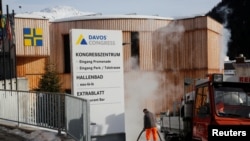Iran's foreign minister has cancelled an expected appearance at next week's World Economic Forum in Davos, Switzerland, organizers said Tuesday, citing the “backdrop of uncertainty” in the Middle East.
The move averts a possible crossing-of-paths with top U.S. officials, including President Donald Trump, in the Alpine town at a time when relations between Iran and the United States have hit a new low.
WEF President Borge Brende cited only the “cancellation” by Foreign Minister Mohammad Javad Zarif, who was notably blacklisted by the Trump administration even before the new tensions. Brende declined to elaborate on the reasons for it.
“We have to understand the cancellation against the backdrop of uncertainty in the region and what his happening in Iran,” he told reporters at WEF headquarters in Geneva at a look-ahead event to the 50th anniversary of the forum.
Word of Zarif's absence came as WEF founder Klaus Schwab warned that the world faces a “state of emergency” and said the window for opportunity is closing fast - notably when it comes to acting to save the environment.
He insisted the annual meeting will be “a `do-shop,' not a `talk-shop'.”
All told, nearly 3,000 leaders from 118 countries are expected for the Jan. 21-24 event. The president of Iraq, Barham Salih, and German Chancellor Angela Merkel are among the 53 heads of state and government set to attend, along with hundreds of business leaders and civil society activists, like environmental campaigner Greta Thunberg of Sweden.
Schwab emphasized the importance of sustainable economic growth, the need for decent jobs and salaries, and plans for skills training for a billion people worldwide over the next decade.
He expressed hopes that a “Green Revolution” will go mainstream and said the World Economic Forum would encourage partner businesses to become carbon neutral. He highlighted an environmental project to plant 1 trillion trees worldwide by 2030 to help gobble up excess carbon dioxide in the atmosphere.
Schwab revived his call for “stakeholder capitalism” to help take the lead in solving global problems.
“Environmental responsibility is very much a part of the stakeholder responsibility,” he said.




